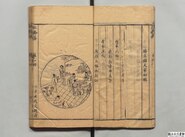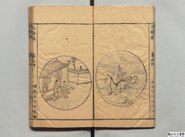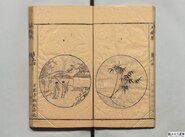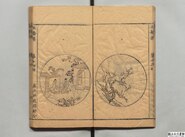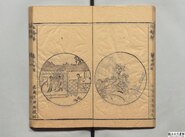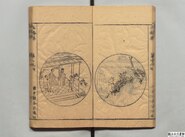



Yu Jiao Li (simplified Chinese: 玉娇梨; traditional Chinese: 玉嬌梨; pinyin: Yù Jiāo Lí; Wade–Giles: Yü Chiao Li), known in the West as Iu-Kiao-Li: or, the Two Fair Cousins, is an early-Qing Chinese caizi jiaren ("scholar and beauty") novel by Zhang Yun (張勻).
Yu Jiao Li is one of the best-known caizi jiaren novels, together with Ping Shan Leng Yan, and Haoqiu zhuan. The English version published by Hunt and Clarke of London in 1827 is an adaptation of Jean-Pierre Abel-Rémusat's French translation.
The novel is about two cousins, Bai Hongyu and Lu Mengli, how they both fell in love with the handsome scholar Su Youbai.
Characters
| This section needs expansion. You can help by adding to it. (January 2014) |
Two of the antagonist characters, Zhang Guiru (張軌如; 张轨如; Zhāng Guǐrú; Chang Kuei-ju) and Su Youde (蘇有德; 苏有德; Sū Yǒudé; Su Yu-te), plagiarize poems written by other people and pretend to be poets. Pseudo-caizi are foils to the real caizi in caizi jiaren stories.
Illustrations of characters and scenes from the novelNotes
- Song, Geng (2004). The Fragile Scholar: Power and Masculinity in Chinese Culture. Hong Kong University Press. p. 20. ISBN 962-209-620-4.
- Starr, Chloë F. (2007). Red-Light Novels of the Late Qing. Leiden, The Netherlands: Koninklijke Brill NV. p. 40. ISBN 978-90-04-15629-6. Retrieved 1 January 2014.
- Iu-kiao-li: or, the Two Fair Cousins (PDF) (English ed.). London: Hunt and Clarke. 1827. p. title page. Archived from the original (PDF) on 4 March 2016. Retrieved 1 January 2014.
- Song, Geng (2004). The Fragile Scholar: Power and Masculinity in Chinese Culture. Hong Kong University Press. p. 203. ISBN 962-209-620-4.
External links
- Iu-kiao-li: or, the Two Fair Cousins Volume I Archived 2016-03-04 at the Wayback Machine (English version, derived from the French version)
- (in French) Iu-kiao-li: or, the Two Fair Cousins (French version, the basis of the English version)
- Also: at the Internet Archive, Volume III in French
This article about a 17th century novel is a stub. You can help Misplaced Pages by expanding it. See guidelines for writing about novels. Further suggestions might be found on the article's talk page. |
